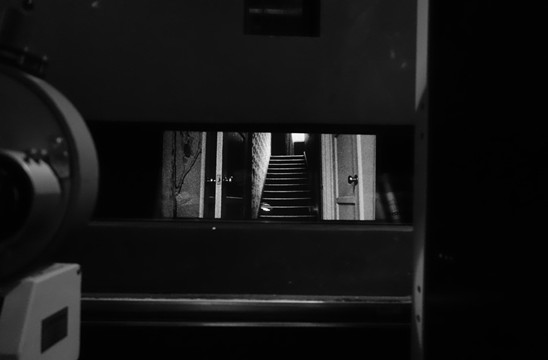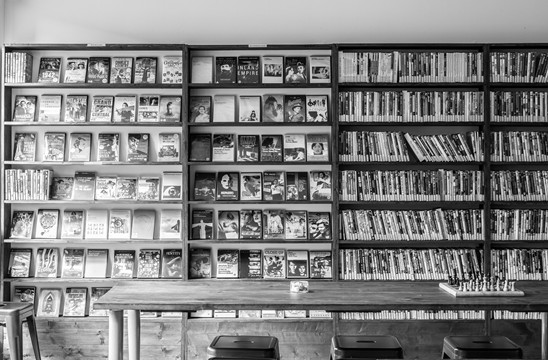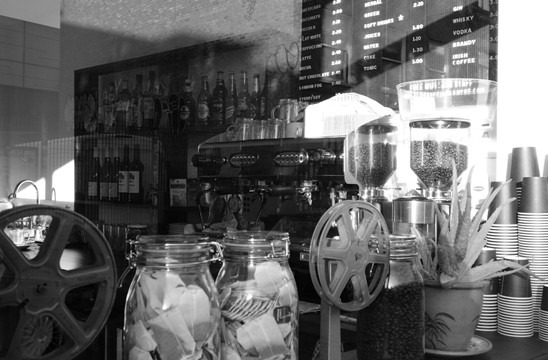
Two pieces of perceived wisdom about the current state of film watching:
- No one rents videos from a physical shop any more
- Film is dead; long live the digital cinema print!
For many years Close-Up Film Centre has boldly stood in opposition to the first principle. The library, which has a thriving clientele in London’s Brick Lane, holds some 19,000 film titles and counting. Over the last two years, they have begun a concerted effort to correct the second preconception, that films shown on film are a thing of the past. Their recently opened cinema, which holds 40 seats, is the centrepiece of Close-Up’s reinvigorated new site on Sclater Street, a stones throw from their longstanding home. We spoke to the library’s owner Damien Sanville during its recent launch on why the time was right to open a cinema now, which cinemas inspired him to open one and why John Cassavetes is the ideal mascot for opening an independent cinema.
Was the idea to run a cinema always an idea for Close-Up or did certain things fall into place?
I always wanted to have a cinema, but finance proved difficult. Two years ago we had the chance to move to this space and we wanted to open a small digital screening room in the basement that could host 20 seats max, no 35mm, perhaps squeeze in 16mm. But we were presented with the opportunity to expand. We took over a photography studio and the opportunities kept expanding. But opportunities need financing and a 300 year old building requires extraordinary work.

Were there particular cinemas you were inspired by, either for Close-Up or your cinema experience?
Anthology Film Archives in New York is a big inspiration. Every big city should have a cinema like that. There should be even more access to the films they’re showing. Light Industry in Brooklyn is a more recent example. The curation behind it is outstanding even though its not a daily programme. As far as cinemas go, I’m definitely more interested in what they show and not the cinema spaces themselves.
And what is the technical set up?
We have a pair of reel to reel 35mm projectors and we also have a 2K DCP, as well as 16mm and almost any other analogue format. 70mm is probably the only thing we don’t have.

Why film shown on film and why the cinema space itself?
Showing films on films is very important for us. I’m certainly an advocate of digital as far as access is concerned. In the last few years there’s been an explosion of releases with extraordinary archives opening their doors for distribution. But I think its important to distinguish between that process of documentation on digital formats, which is valuable, and experiencing a work of art in a specific context: the black box of the cinema. Cinema is a fundamentally immersive experience. To be in a black box, to have this silent environment, without disruption; that’s unique. Cinema gives us a chance to consider a film in a completely different way; its a physical experience that’s radically different. I would say its the difference between listening to music on stereo and going to a live concert. There’s a universe that separates digital from film.

Why do you think a film library is important? What do you have to say to the type of person who believes all this material is available online?
Personally, I wasn’t an advocate of video shops in general. When I was younger, cinemas were where you discovered the films. But I think that that process has changed in last decades. In the last few months Stoke Newington Film Shop and Notting Hill Video City have closed and it really had me thinking: Where are people going to see these films? They’re not in cinemas. You can see that there’s an increased curiosity about culture, and film especially, thanks to younger generations access to social media. But it’s a complete myth that everything is available online. 80% of what we have isn’t available on another platform. For me as a student, cinema was a part of our everyday life. People were talking about it and it was everywhere. Now the commercial aspect has bulldozed a lot of that and I hope we can help rebuild.

What will the programme be?
First and foremost, repertory cinema. We want to show all the great directors and films on a regular basis, from early cinema to contemporary films. Of course, there’s nothing original about that. In London alone you have the BFI, but if you miss one of their screenings you can wait a decade to see it again. In the past you had many venues where Tarkovsky, Bergman and others would be regularly screened. We want to host double bills and themed programmes but also lesser known directors and films. As with the collection, we’ll be showing plenty of experimental cinema and artists moving image. We’ve already invited in a lot of outside organisations for events and we’d be happy for curators to approach us if it ties in with what we do. We also want to run some seminars in the cinema during the daytime to tie in with the programming.
And finally, why a season dedicated to John Cassavetes to open the venue?
Because it’s John Cassavetes.

